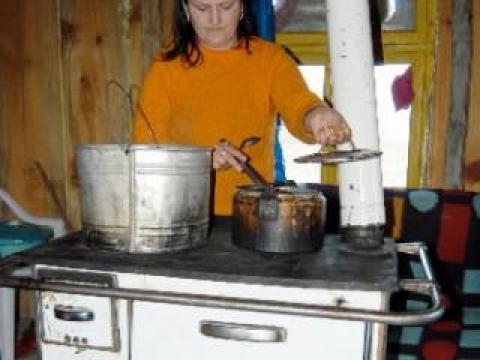Discovering how women are treated in a man’s world

Dibra is situated among breathtaking mountains that divide Albania from Macedonia, about a four-hour drive northeast of the capital city Tirana. The cold, rugged mountain environment and the traditional culture make life very difficult for the people there. I was struck by both the beauty of the surroundings and the harshness of the life.
Dibra area development programme (ADP) Manager Genta Belilaj took me out to meet the people in the villages to see how they really live. One Dibra village woman described her life this way, “I learn what my husband expects and I do it. This is called harmony in our lives.”
In the Dibra area, I learned that families are dominated by either the father or the grandfather, and often their rule is harsh and abusive. Most men operate their homes according to “Kanun”, the ancient traditional law which essentially allows men to treat women as property.
According to the Dibra Area Development Programme (ADP) assessment, almost all women, if they are honest, admit to suffering physical abuse from their husbands. Women are routinely discriminated against with respect to access to education. Many young women in the villages are pulled out of school early because tradition says anything more than elementary education is wasted on women. Almost all women are afraid of anything that would go against a man’s decision because violence will often result.
World Vision staff told me that women are excluded from family decision-making in almost all cases. Women are given little or no choice in their marriage partners, with senior men in the families making all the necessary arrangements for them.
To improve the situation, World Vision staff wanted to allow women to speak their minds about important matters in their lives. “We held informal women’s meetings in several villages to introduce them to the idea of working together,” said Genta Belilaj, Dibra ADP manager. “Our main objective was to convince the women themselves that there are things they could do to improve their own lives.”
The informal meetings culminated in a Women’s Day forum at the cultural education center, which was attended by 150 women. “This was the first time I saw a lot of women coming together for anything. It was our only day to forget about family issues and celebrate together,” said 36-year-old Elena. “I learned about women’s and children’s rights and now I want to know more in order to raise my children better and improve my life,” said 32-year-old Elahame.
I left Dibra feeling very proud of the World Vision staff who are trying to make things better in a very difficult traditional world. I have a deeper understanding of the struggles of the people who live in the valleys below the beautiful, but rugged mountains of northern Albania.
-Ends-